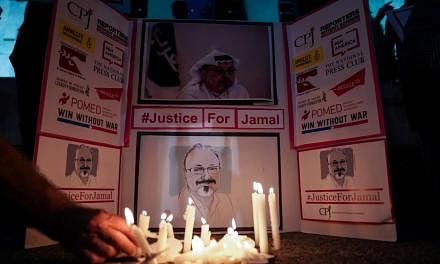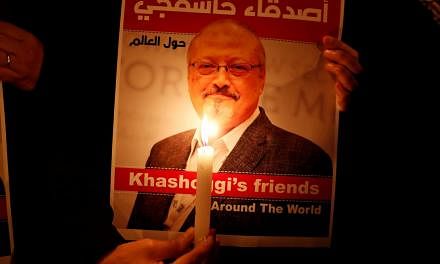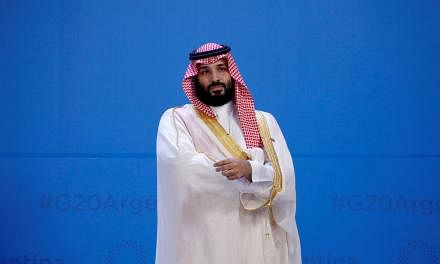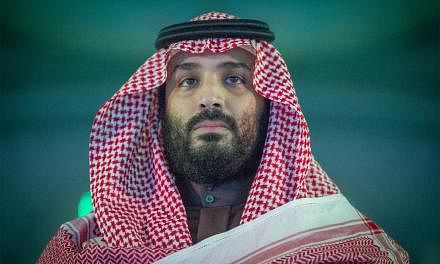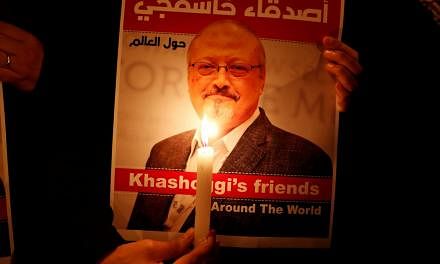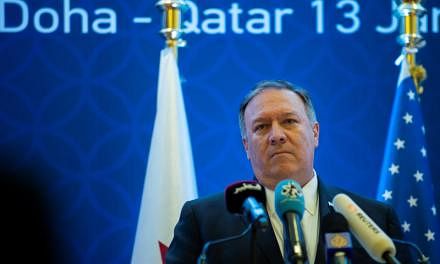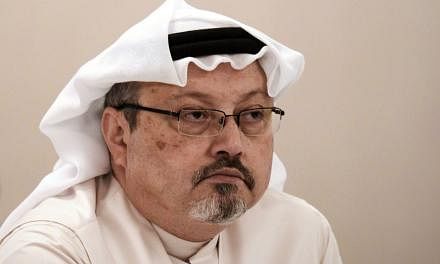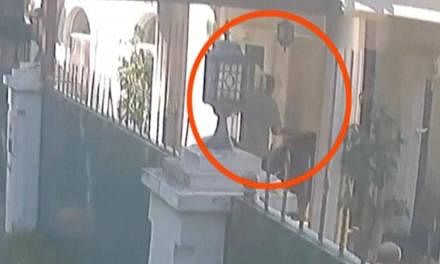NEW YORK (NYTIMES, AFP) - The disappearance of Saudi dissident Jamal Khashoggi has set off a diplomatic feud between Saudi Arabia and Turkey, a bipartisan uproar in the US Congress, tremors of uncertainty in Wall Street and Silicon Valley about how to deal with Saudi Arabia, and a noisy spat between the White House and its closest Arab ally.
On Monday (Oct 15) morning, President Donald Trump said on Twitter that he had just discussed the case with King Salman, who denied any knowledge of what had happened to Khashoggi, and that he was "immediately sending" Secretary of State Mike Pompeo to meet with the king.
Later, in brief remarks to reporters, he said that from his conversation with the king, "it sounded to me like maybe these could have been rogue killers - who knows."
US officials have speculated that if Saudi Arabia confirms suspicions that Khashoggi was killed, it would propose that rogue elements acted on their own, not under orders from the highest levels of power in the kingdom.
Turkish officials have described a grisly assassination and cover-up, with Saudi agents dismembering the body for disposal.
A team of Turkish police investigators and prosecutors on Tuesday (Oct 16) left the Saudi consulate in Istanbul after conducting an unprecedented eight-hour night-time search.
The Turkish team, who conducted the investigation alongside a Saudi delegation, returned to their vehicles and left the premises, an AFP correspondent said.
They took samples with them, including soil from the consulate garden that was loaded into vans, one official present said.
The furore over Khashoggi, last seen entering the Saudi Consulate in Istanbul, has severely damaged the image in the West of Crown Prince Mohammed bin Salman. The prince, 33, has worked hard to portray himself as a reformer determined to open up the kingdom's culture and economy, but Khashoggi's disappearance is undermining the prince's efforts to lure technology companies and Wall Street investors to Saudi Arabia to help wean it from dependence on oil.
The complex, confusing case raises a range of important questions, some with ready answers and some without:
Why is Washington reacting so strongly to this disappearance?
Khashoggi, who was 59 when he disappeared, was well-known and well-liked by journalists and diplomats who travelled to the kingdom.
He had worked in the Saudi embassies in Washington and London, and some suspected he had also worked for Saudi intelligence. Then, over years in the Saudi news media, he established himself as a kind of unofficial spokesman for the royal family, which often preferred to speak through surrogates.
His independent streak and empathy for the Western perspective made him a uniquely important, well-liked contact for foreign journalists and diplomats seeking to understand the royal perspective.
Then came Mohammed bin Salman, who became crown prince last year and has consolidated unrivalled control over the levers of power inside the kingdom.
After that, Khashoggi felt there was no longer room in Saudi Arabia for even his relatively modest degree of independence. He relocated to Virginia, became a columnist for The Washington Post, and reinvented himself as the prince's most prominent critic in the West.
When was Khashoggi last seen in public?
Khashoggi walked into the Saudi Consulate in Istanbul around 1.15 pm on Oct 2 for an appointment to pick up a document.
Under the strain of his voluntary exile from Saudi Arabia, his marriage had ended in a divorce, and he had since become engaged to a Turkish woman. Khashoggi needed certification from the Saudi authorities of his divorce so that he could remarry in Turkey; the wedding was planned for the next day.
The Turkish authorities have released video footage of him walking into the consulate, but they say there is none of him walking out. The Saudis, while insisting that he left the consulate safely, have not offered any evidence.
Khashoggi's fiancée waited for him outside the consulate for hours.
Was the prince out to get Khashoggi?
If Khashoggi was killed or abducted by Saudi operatives, Prince Mohammed would have had to have authorised the plan, experts on the kingdom's internal workings say.
The prince has shown little tolerance for critics of the Saudi government, and many of those who have spoken out have been jailed. So it is reasonable to assume that he was not a fan of Khashoggi's.
Since Khashoggi disappeared, it has also become clear that he had close ties to the Muslim Brotherhood, an international Islamist movement that in recent decades has embraced elections as the best way to bring change to the region - another reason the prince might have felt hostile toward him.
Until recently, Saudi Arabia welcomed members of the Muslim Brotherhood fleeing persecution in other Arab states, especially Egypt.
Then Arab Spring uprisings convinced leaders of the royal family that the Brotherhood threatened them, too, and Saudi Arabia declared the group a terrorist organisation.
US intelligence agencies had reportedly intercepted Saudi communications about the possible abduction of Khashoggi at the request of the prince, according to a senior former U.S. official. But there is no indication that those discussions were related to Khashoggi's visit to the consulate.
Did Saudi agents abduct or kill Khashoggi?
This is where the mystery begins. Turkish officials, speaking on the condition of anonymity, have said that their government has detailed evidence of a gory assassination, which they say the Saudi leadership ordered.
The day Khashoggi disappeared, 15 Saudi agents flew into Istanbul on two private jets chartered by a company with close ties to the prince and the Saudi Interior Ministry, the Turks say. The agents waited for Khashoggi inside the consulate and killed him within two hours of his arrival, the Turkish officials contend.
Among the Saudi agents was a doctor who specialised in autopsies, and the group had brought a bone saw into the consulate, which it used to dismember Khashoggi, according to the Turkish officials.
But the Turks have not yet made public their findings, some of which may come from secret electronic surveillance.
President Recep Tayyip Erdogan of Turkey, a personal friend of Khashoggi's, has repeatedly demanded an explanation from the Saudis but has not made specific accusations.
Prince Mohammed and other Saudi officials have denied any knowledge of Khashoggi's whereabouts, insisting without evidence that he left the consulate freely.
If Turkey has evidence, why doesn't it show it?
This is where the mystery veers from criminal investigation to international intrigue. Turkish officials hint that they have withheld the evidence so far in order to avoid exposing intelligence sources, which could include human informants or electronic surveillance.
It is also unclear whether Turkey has shared its evidence with allies like the United States or Britain.
Turkish intelligence often cooperates closely with Western intelligence agencies, and the Turks could presumably share their evidence with those partners without exposing their sources. Sharing the evidence with Western governments - not just describing it to them - would increase the pressure on Saudi Arabia to explain more about Khashoggi's fate.
Experts have pointed to another, more cynical possible explanation for Turkey's reticence about releasing evidence: It may quietly seek some kind of deal with Saudi Arabia that could prevent full disclosure.
Turkey and Saudi Arabia are regional rivals on opposite sides of an ideological feud over Brotherhood-style political Islam. But until now, the two countries have worked hard to bridge their disagreements, in the interest of working together on areas of common interest, like the Syrian civil war.
Labouring under an economic crisis brought on by excessive borrowing, Turkey can ill afford a long-running conflict with a wealthy trading partner like Saudi Arabia. It might even welcome Saudi aid or investment.
What might a deal look like?
Many analysts with experience in the region speculate that the Saudi royal court could pin Khashoggi's disappearance or death on a "rogue element" within the Saudi security services.
Turkey could accept that explanation, both sides could move on, and the world would never learn the truth about what evidence, if any, the Turkish authorities had.
Whose side is Trump on?
Trump has given mixed signals about his interest in the Khashoggi case.
On the one hand, he has pointedly noted that Khashoggi was not a US citizen and that his disappearance occurred far from American soil. He has also repeatedly ruled out cutting off arms sales to Saudi Arabia, on the grounds that those contracts bring money and jobs to the United States.
On the other hand Trump vowed over the weekend that there would be "severe punishment" if Saudi Arabia were proved to have killed Khashoggi.
That threat drew an extraordinary pushback from the Saudis. If Saudi Arabia "receives any action, it will respond with greater action," the Foreign Ministry said in a statement, citing the oil-rich kingdom's "influential and vital role in the global economy."
Saudi Arabia "affirms its total rejection of any threats and attempts to undermine it, whether by threatening to impose economic sanctions, using political pressures, or repeating false accusations," the Foreign Ministry said.
The possibility of a rift between Trump and Prince Mohammed over Khashoggi is remarkable, because the Trump administration has embraced Saudi Arabia as its premier Arab ally. Trump's son-in-law and Middle East adviser, Jared Kushner, 37, has grown especially close to Prince Mohammed, a near-contemporary in age.

